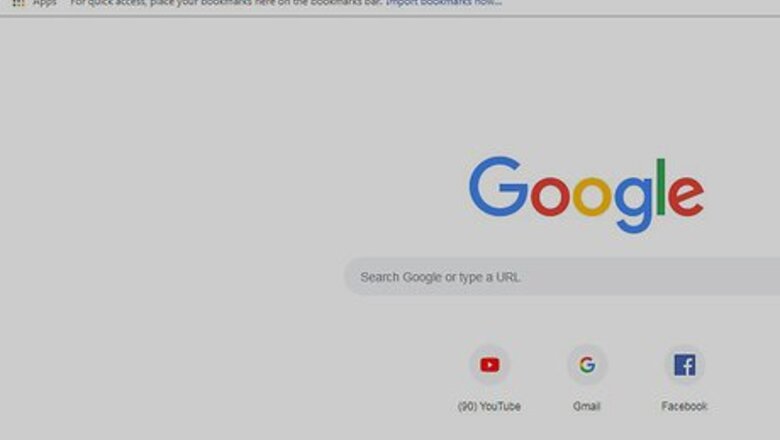
views
- If you already have a Google account, you can use it to access Gmail. If not, you can create one for free.
- You can send and receive email with Gmail in any web browser by visiting https://www.gmail.com.
- Download the Gmail app on your iPhone or iPad from the App Store, or for your Android from the Play Store.
Sending an Email
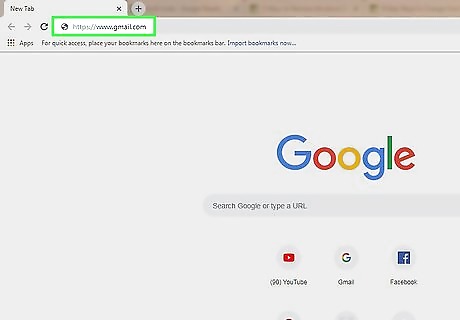
Go to https://www.gmail.com in your computer's web browser. You can log in to Gmail on any Windows PC or Mac using a web browser like Chrome, Safari, or Microsoft Edge. This will open your Gmail inbox if you're logged in. If you aren't logged in, you'll need to enter your email address and password when prompted. If you don't have a Gmail account, you can create one for free.
Click Compose. It's in the top-left corner of the page. Doing so prompts a "New Message" window in the lower-right side of the page.
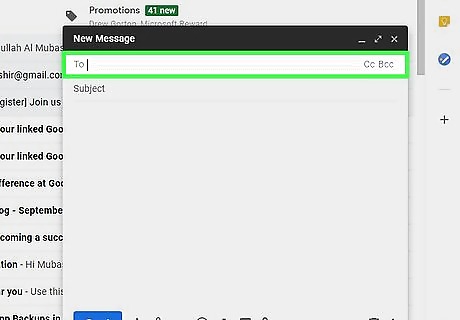
Enter your recipient's email address. In the "To" text box, type in the email address of the person whom you want to contact. To add another person to the "To" text box, press the Tab ↹ key after you finish typing the first person's email address. If you want to CC (or BCC) someone, click the Cc (or Bcc link) on the right side of the "To" text box and then enter the person's email address in the "Cc" (or "Bcc") text field that appears.
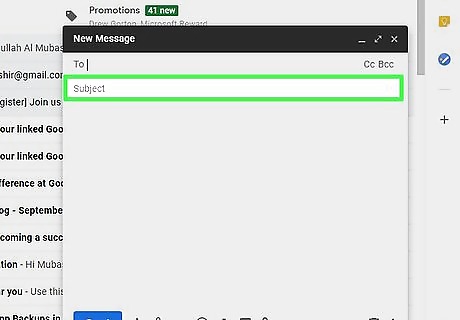
Add a subject. Click the "Subject" text box, then type in whatever you want to use for the email's subject. In general, it's best to keep your subjects limited to a few words.
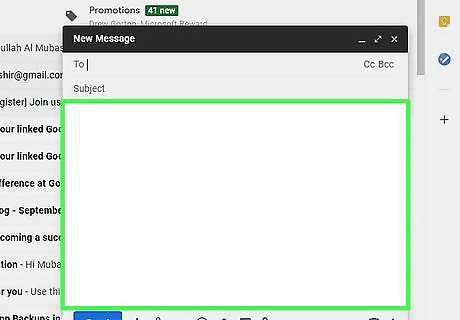
Enter your email's body text. In the large text box below the "Subject" field, type in whatever message you want to send to your recipient(s).
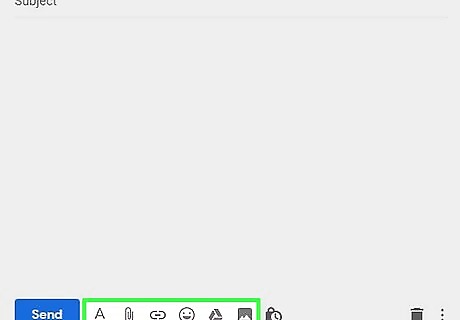
Add formatting or attachments to your email. While optional, you can easily change the appearance of your message's text, attach a file, or upload a photo: Formatting — Select the text you want to format by clicking and dragging across it, then click one of the formatting options at the bottom of the email. Files — Click the paperclip Android 7 Paperclip icon at the bottom of the email, then select files to upload. Photos — Click the "Photos" Android 7 Image icon at the bottom of the email, then select a location and select photos to upload.
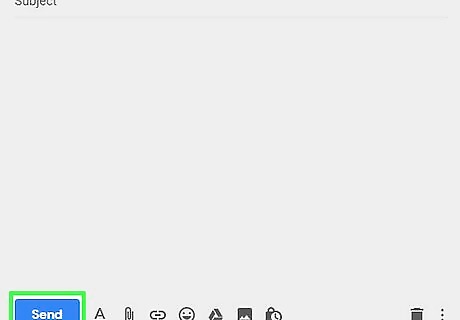
Click Send. It's at the bottom of the "New Message" window. Doing so will send your email to the specified recipient(s).
Managing Your Emails
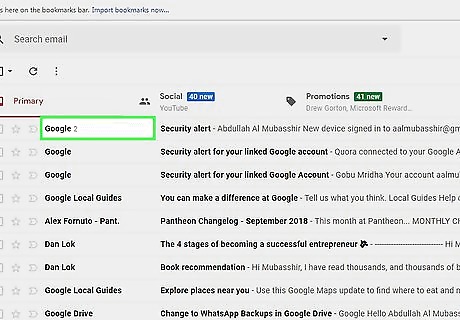
Open an email in your inbox. Click an email's subject to open the email in the inbox. To exit an open email, click the left-facing arrow above the upper-left corner of the email.
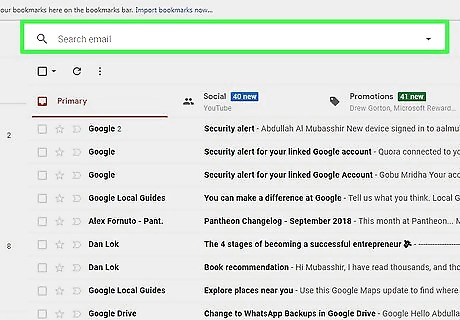
Search through your emails. You can scroll through your inbox to view emails there, or you can click the search bar at the top of the page and then type in whatever you're searching for (e.g., a subject or a sender).
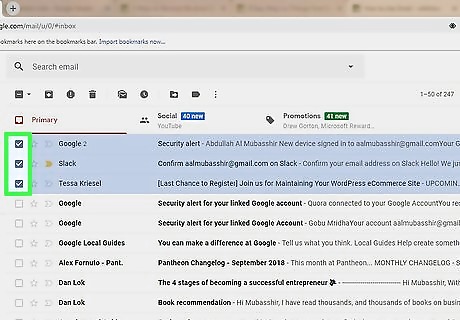
Select emails as needed. If you want to select a group of emails, click the checkbox to the left of each email you want to select. This is useful when moving or deleting large groups of emails all at once. To select an entire page of emails, click the checkbox above the top-left side of the top email.
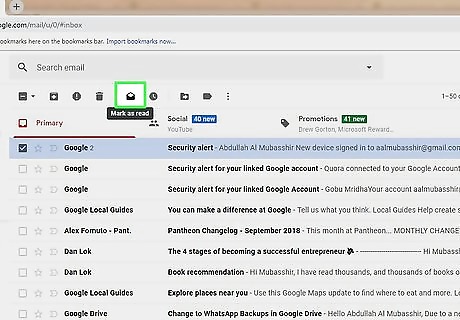
Mark emails as read. Select the emails you want to mark as read, then click the open envelope icon at the top of the inbox. Opening an email will also mark it as read.
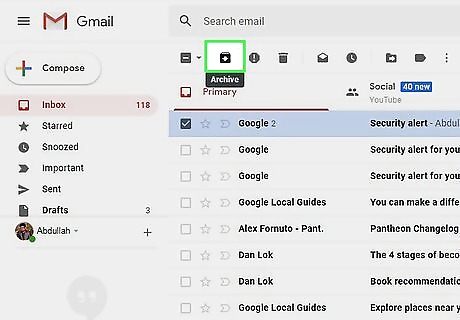
Archive emails. Archiving an email allows you to save the emails without having them in your inbox folder. To archive emails, select the emails in question, then click the downward-facing arrow icon at the top of the page. You can find archived emails by clicking the All Mail folder on the left side of the page, though you may have to scroll down (and/or click More) on the left-hand menu to find this option.
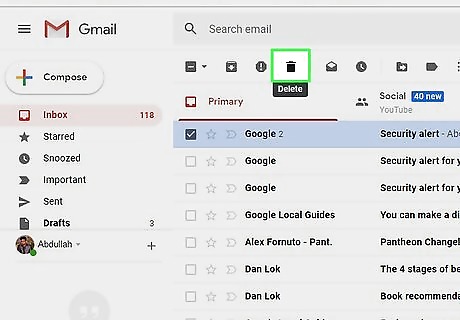
Delete emails. To delete emails from your inbox, select the emails you want to delete, then click the "Trash" Android 7 Delete icon at the top of the window. Deleting emails from your inbox doesn't permanently delete them immediately—they'll move to the Trash folder where they'll remain for 30 days before being deleted automatically.
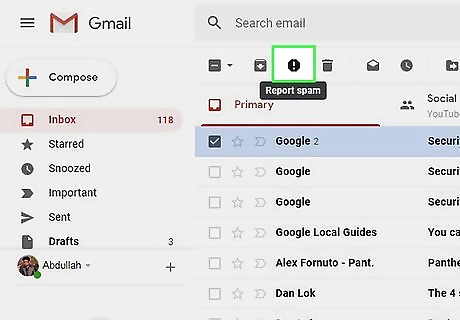
Mark emails as spam. Sometimes undesirable emails will find their way into your inbox. You can mark these emails as "spam" by selecting them and clicking the ! icon at the top of the inbox; doing so will both add the emails to the Spam folder and tell Gmail to add similar emails to the Spam folder in the future. You may have to mark emails from the same sender as "spam" a few times before the emails stop appearing in your inbox.
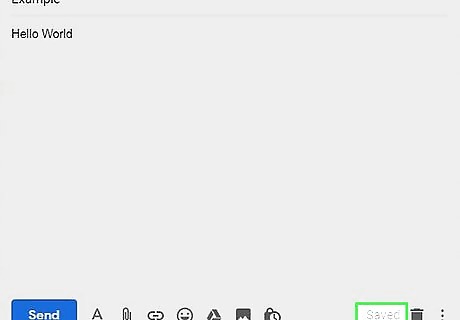
Add a draft. If you want to start working on an email but don't have time to finish it, you can save it as a draft by waiting for the word "Saved" to appear in the lower-right side of the "New Message" window and then closing the email. You can then open it from the Drafts folder on the left side of the page. As with All Mail, you may have to scroll down and/or click More to find the Drafts folder.
Creating and Using Labels
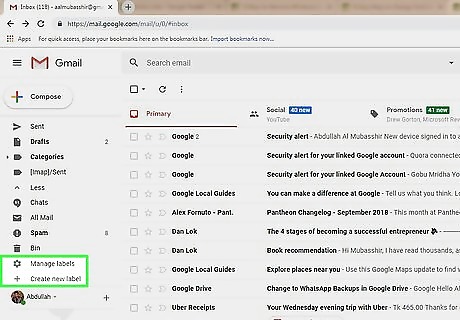
Know what labels do. "Labels" are Gmail's versions of folders; when you assign a label to an email, the email is added to the label's folder in the left-hand menu.

Open Gmail's Settings. Click the "Settings" gear Android 7 Settings in the upper-right side of the page, then click See all settings in the resulting drop-down menu.
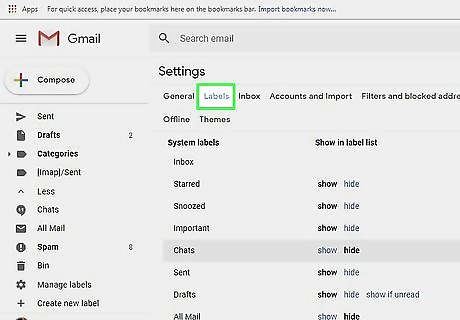
Click Labels. It's a tab at the top of the window.
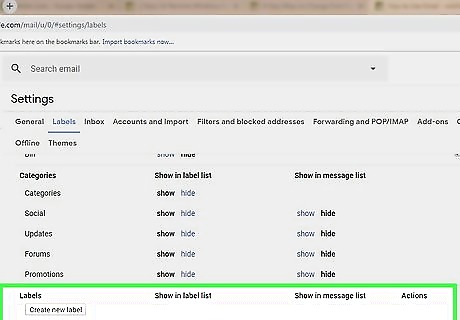
Scroll down to the "Labels" section. This section is toward the bottom of the page. Doing so displays a list of your custom labels. If you haven't created any labels yet, this section will be empty.
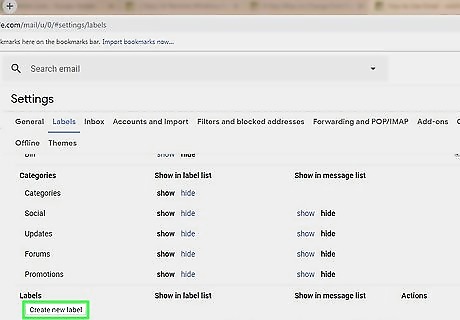
Click Create new label. It's at the top of the "Labels" section. A pop-up window will appear.
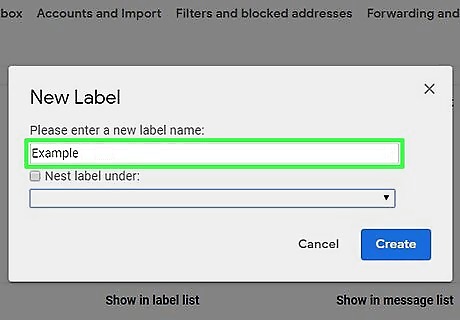
Enter a label name. Type whatever you want to name your label into the text box at the top of the pop-up window. If you want to add the label to an existing label (similar to placing a new folder inside of an existing folder), you should also check the "Nest label under" box and then select a label from the drop-down menu.
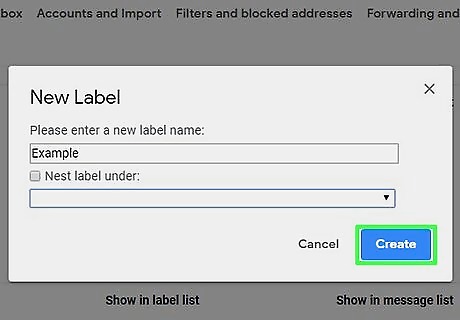
Click Create. It's at the bottom of the window.
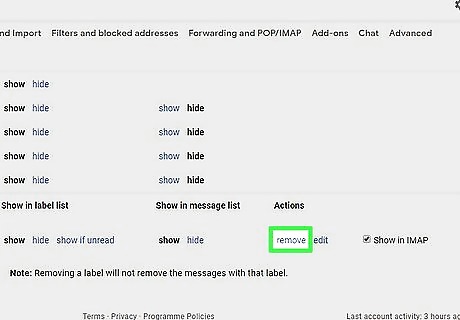
Remove any existing labels if necessary. If you have existing labels that you want to delete, do the following: Scroll down to the label you want to remove in the "Labels" section. Click remove to the right of the label. Click Delete when prompted.
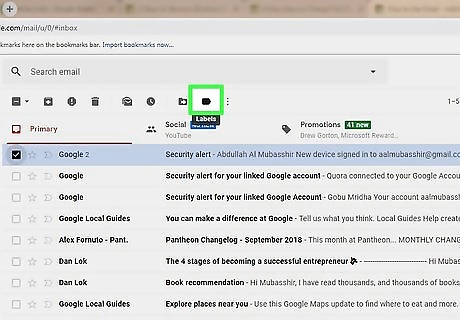
Add emails to a label. Select emails to add to a label, then click the "Labels" Android 7 Label icon and click the label you want to use in the resulting drop-down menu. You can also create a new label in the drop-down menu by clicking Create new and entering the label's name.
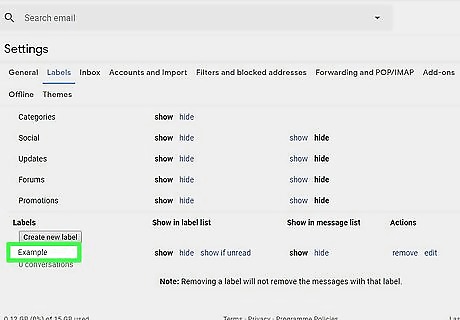
View your label's contents. Once you've created the label and added emails to it, you can view the emails by clicking the label's name on the left side of the inbox. To view all of your labels, you may have to click More and then scroll down on the left side of the inbox. If you want to remove the label's emails from the inbox without deleting them, you can archive the emails.
Managing Contacts
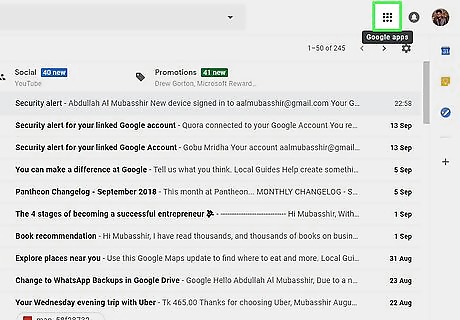
Click the "Apps" Android 7 Apps icon. It's in the top-right corner of the Gmail inbox. A drop-down menu full of icons will appear.
Click Contacts. It's a blue person-shaped icon. This will open your Gmail Contacts page.
Review your contacts. Depending on whether or not you've used Gmail before, you may see a few contacts here. Contacts may range from only names to full profiles including names, addresses, phone numbers, and email addresses.
Click + Create contact. It's at the top-left corner of the page. Doing so brings up a pop-up window.
Click Creaet a contact on the pop-up. Now you'll see a form into which you can add your contact's personal information.
Enter the contact's name and other contact information. Type as many details as you'd like to add for your contact, including the first name, last name, and email address.
Click Save. It's at the top-right corner of the contact's information. Doing so saves your contact and adds them to your account's contact list.
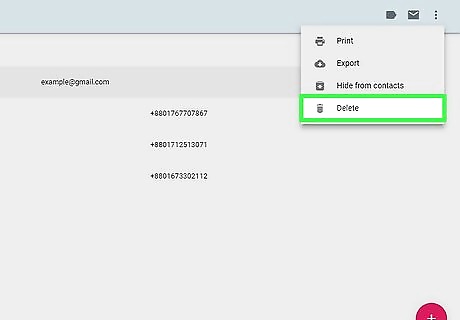
Delete a contact. If you want to remove a contact, do the following: Hover over the contact's name, then click the checkbox that appears on the left side of their name. Click ⋮ in the upper-right side of the page. Click Delete in the drop-down menu. Click Move to trash when prompted.
Using Gmail on Mobile
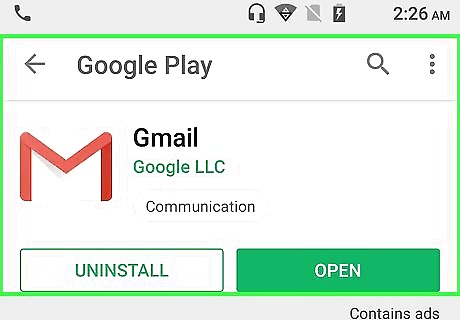
Install the Gmail app if necessary. If you don't have the Gmail app installed on your iPhone, iPad, or Android, iPhone App Store Icon App Store (iPhone) or the Android Google Play Google Play Store (Android), search for Gmail, and download it. Gmail is always free to download and use, so don't pay for any app claiming to be Gmail. Gmail is almost always pre-installed on Android smartphones and tablets.
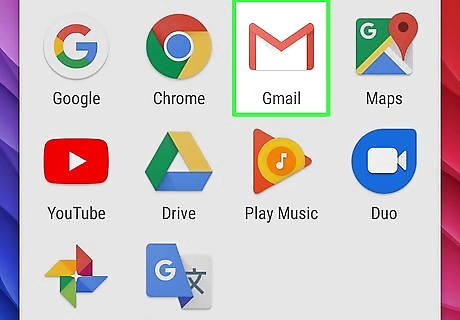
Open Gmail. Tap the Gmail app icon, which resembles a red "M" on a white background. This will open your Gmail inbox if you're already logged in. If you aren't logged in, enter your email address and password when prompted. You may instead just need to select your Gmail account.
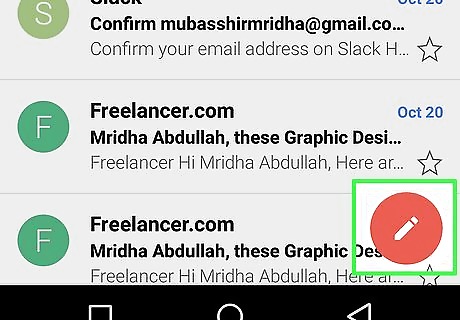
Send an email. While some account management options on mobile are limited, you can still use Gmail for its primary purpose: sending emails. To send an email, tap the "Compose" Android 7 Edit icon, then fill out the resulting form and tap the "Send" Android 7 Send icon.
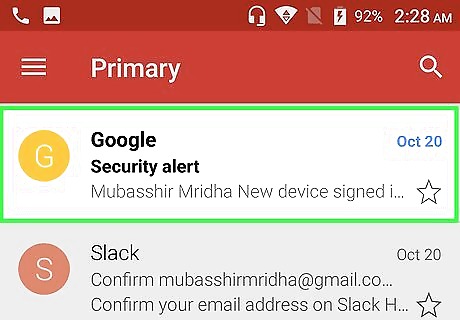
Open an email. Tap an email to do so.
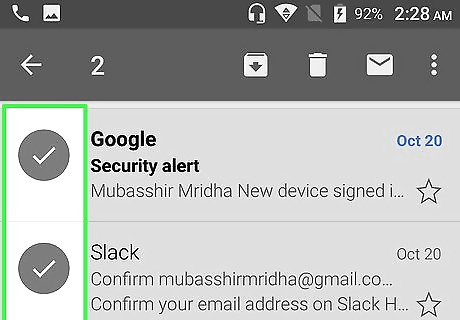
Select multiple emails as necessary. If you want to select multiple emails in order to archive or delete them all at once, tap and hold one email until a checkmark appears on the left side of the email, then tap any other emails you want to select. Once the first email is checked, you don't have to tap and hold subsequent emails. To cancel your selection, tap the "Back" Android 7 Expand Left icon in the upper-left side of the screen.
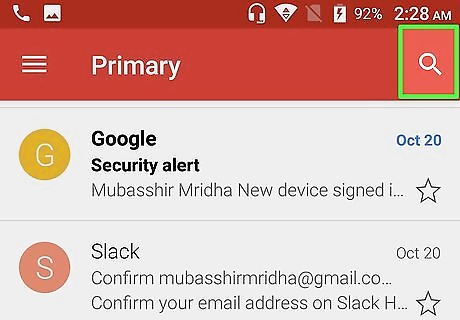
Search your emails. If you want to search for a specific keyword, sender, or subject, tap the "Search" Mac Spotlight icon in the top-right corner of the screen, then type in whatever you want to search for.
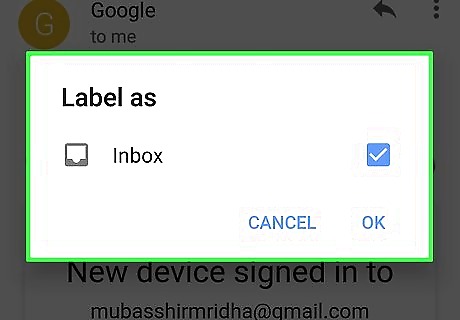
Add emails to labels. Just like on desktop, you can add emails to labels on your mobile platform. Unlike on desktop, you cannot create labels if you're using an Android phone or tablet.
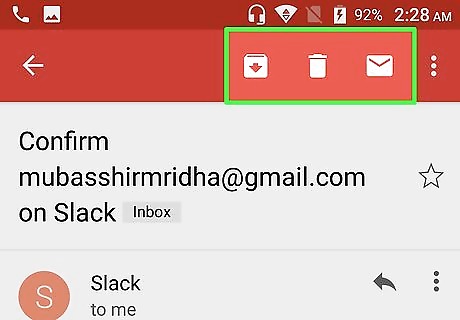
Manage your emails. There are a few different ways in which you can manage your mobile Gmail inbox: Archive — Select emails to archive, then tap the downward-facing arrow at the top of the screen. Delete — Select emails to delete, then tap the "Trash" Android 7 Delete icon at the top of the screen. Mark as read — Select unopened emails, then tap the open envelope icon at the top of the screen. Mark as spam — Select a spam email, tap ⋯ (iPhone) or ⋮ (Android), tap Report spam in the drop-down menu, and tap Report spam & unsubscribe if available (if not, just tap Report spam when prompted).
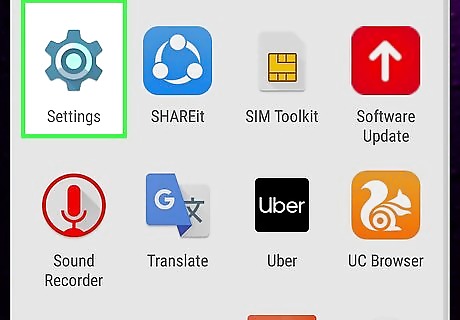
Enable Gmail notifications for your smartphone. If you want to receive notifications from the Gmail app whenever you receive an email, do the following: iPhone — Open your iPhone's iPhone Settings App Icon Settings, tap Notifications, scroll down and tap Gmail, and tap the white "Allow Notifications" switch (if the switch is green, notifications are enabled). Android — Open your Android's Android 7 Settings App Settings, tap Apps, scroll down and tap Gmail, tap the "Notifications" heading, and tap the white "ON" switch (if this switch is blue, notifications are enabled).




















Comments
0 comment